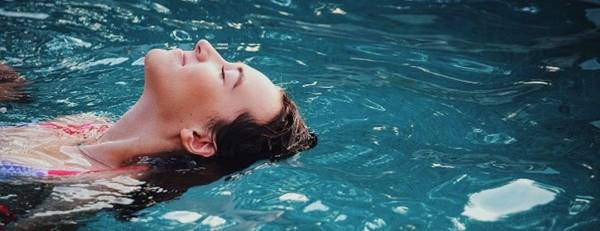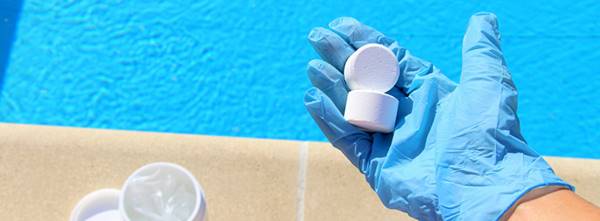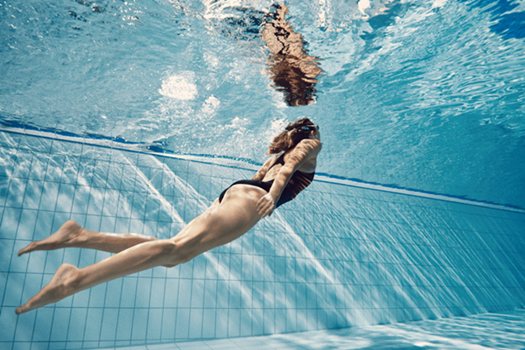Leaving chlorine in your hair overnight can have various negative effects on your scalp and hair. Chlorine is used to disinfect the water and is commonly found in swimming pools. While it’s effective at preventing the spread of waterborne illnesses and killing bacteria, it can be harsh on your hair and skin. If you leave chlorine in your hair overnight, here’s what could happen:
What Happens If You Leave Chlorine In Your Hair Overnight?

- Discoloration: Over time, chlorine can cause light-colored or blonde hair to develop a greenish tint. This situation is especially true if the chlorine interacts with some other chemicals, such as copper compounds in the water.
- Damage and Dryness: Chlorine is a strong chemical that can strip your natural hair oils, leaving it brittle, dry, and prone to damage. This can lead to breakage and split ends.
- Sensitivity and Irritation: Chlorine can irritate your skin and scalp, leading to itchiness, dryness, and redness. Some people may also develop an allergic reaction or sensitivity to chlorine, exacerbating these symptoms.
- Frizz and Tangles: Chlorine-damaged hair can become unmanageable, frizzy, and prone to tangling. This can make it difficult to style and comb through your hair.
- Loss of Shine: Chlorine can strip away the natural shine of your hair, leaving it looking lackluster and dull.
- Weakening: Too much exposure to chlorine can weaken the hair shaft, making it more susceptible to breakage and damage.
How long can chlorine stay in your hair?

Chlorine can stay in your hair for a variable amount of time, depending on factors such as your hair’s porosity, the concentration of chlorine, and how well you rinse it after exposure. Chlorine molecules can bond to hair proteins and become trapped in the hair shaft. In some cases, it might take multiple washes with water and shampoo to completely clear chlorine from your hair. Using a specialized swimmer’s shampoo or a clarifying shampoo can help expedite the removal process.
To reduce the nagative effects of chlorine on your hair, it’s important to rinse your hair after swimming in chlorinated water. Use a clarifying shampoo to help remove the chlorine buildup and follow up with a quality moisturizing conditioner to restore some of the lost moisture. If you suspect your hair has been dramatically damaged by chlorine, consider deep conditioning treatments and avoiding further exposure to chlorinated water until your hair has had a chance to recover.
FAQs
Can I leave chlorine in my hair for one night?
No, leaving chlorine in your hair overnight is not recommended. Leaving chlorine in your hair overnight is not advisable. Chlorine can strip your hair of natural oils, leading to color fading, dryness, damage.
Can chlorine permanently damage your hair?
Yes, prolonged exposure to chlorine can cause permanent damage to your hair. Chlorine can strip the natural oils from your hair, causing brittleness, dryness, and color fading. It can also weaken the hair shaft, making it more prone to breakage. Using hair care products and taking precautions can help mitigate the effects of chlorine exposure.
Does rinsing hair remove chlorine?
After exposure to chlorine, rinsing your hair with water can help remove some of the chlorine residue, but it might not completely eliminate it. Chlorine molecules can bond to hair proteins and become somewhat trapped within the hair shaft. While rinsing hair can help reduce the immediate effects of chlorine, using a specialized swimmer’s shampoo or a clarifying shampoo is more effective in thoroughly removing chlorine and its residues from your hair.
Can I prevent chlorine damage to my hair while swimming?
To prevent chlorine damage while swimming, wear a swim cap, wet your hair before entering the pool, rinse hair afterward, condition regularly, use chlorine-removing shampoo, avoid heat styling, opt for protective hairstyles, stay hydrated, limit chlorine exposure, and get regular trims to remove damaged ends.
Does wearing a swim cap really protect hair from chlorine?
Wearing a swim cap can provide some protection for your hair from chlorine, but protection is not 100% effective. Swim caps create a barrier between the chlorinated water and your hair, reducing the direct exposure to chlorine. However, some water may still seep in over time, especially if you spend extended periods in the water or if the cap doesn’t fit tightly. To maximize protection, it’s a good idea to combine the use of a cap with other preventative measures, such as rinsing it immediately after swimming, wetting your hair before swimming, and using chlorine-removing shampoos and conditioners.
Are there natural remedies to remove chlorine buildup from hair?
Yes, natural remedies to remove chlorine buildup from hair include baking soda paste, vinegar rinses, coconut oil as a protective barrier, clarifying shampoos with natural ingredients, lemon juice rinses and ascorbic acid (Vitamin C) rinses. While these methods may help, dedicated chlorine-removing products are often more effective for thorough removal.
If you accidentally leave chlorine in your hair overnight, take steps to reduce the damage as soon as possible by using appropriate haircare products, thoroughly rinsing your hair, and providing extra care and hydration to your hair and scalp


